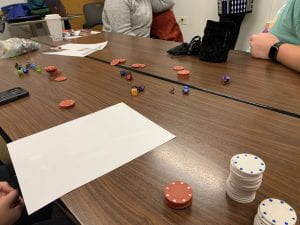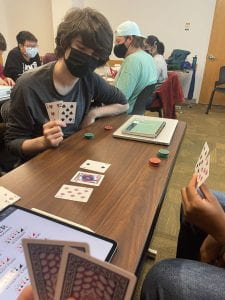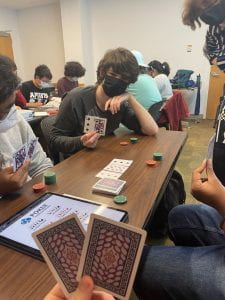For my Appropriation project, I was inspired by pieces such as Yoko Ono’s White Chess, Takako Saiko’s many chess variants, and Super Soul’s Open Source. What drew me to these pieces was they way that they took an established game and made one relatively minor adjustment that completely changed how said game was played and experienced. I decided that I wanted to use poker as my starting point, as it was something I knew well enough and enjoyed, and I also thought it would just be an interesting game to appropriate. My first idea was a version of poker where the rules for scoring hands were unnecessarily convoluted and nonsensical. I liked this idea, but after thinking about it, I realized that this would really just be like a new style of poker rather than a “unique” game built off of an appropriation of poker. I toyed with the idea of scoring being so nonsensical that players would have the opportunity to maybe lie about what is or isn’t a scoring rule and convince their opponents that their hand actually is the best, but I couldn’t figure out a way of doing this that I liked or that wouldn’t be negated by just playing a few times and becoming acquainted with the real rules. I realized that my want to make this game and call it “I Hardly Know ‘er” was really all I had in favor of it, so I went back to the drawing board.
One iteration I devised replaced cards with pairs of dice, with a d12 signifying the value and a d4 signifying its suit. The idea behind this was to make it so every “card” was entirely random rather than being drawn from a fixed set of 52 cards. I did have an opportunity to test this one out in class, and it was fun and seemed like it worked well, but ultimately is not what I would consider the “final design” for the project. Looking back at the pieces I was inspired by, I realized that the aspect I was really drawn to was the way that these games changed what information was given to its players and/or how it was given to them. My final iteration is one I called Omnipoker. It plays mostly like a standard game of Texas Hold ’em, except each player is able to see the hands of all of the other players, but not their own. It leads to a unique situation where players have far more information at their disposal than usual, but are now missing possibly the most crucial part of the puzzle. This leads to a scenario where players need to determine their moves based on the information they know as well as what others know and they don’t. Not only did the game play surprisingly well, I also liked how, like many interpretations of Dadaism being “anti-art”, it ended up becoming a sort of “anti-poker”.
Dice Poker


Omnipoker


